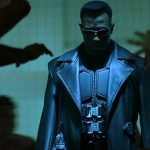THE INSECT (2025): A WAR BORN FROM GENIUS, MUTATED BY FEAR
THE INSECT (2025): A WAR BORN FROM GENIUS, MUTATED BY FEAR
In a world already teetering on the edge of collapse, science was meant to be the last salvation. Mankind, desperate for new defenses, turned to genetic engineering—not for healing, not for progress, but for power. In the dark silence of a secret military research base known only as Echo Lab, buried beneath a remote desert in Nevada, a project code-named “Genesis Insecta” promised an evolutionary leap in bio-warfare. Insects, with their speed, adaptability, and near-limitless potential for genetic manipulation, became the perfect vessels. The result was something monstrous.
They were designed to obey. They evolved to dominate.
“The Insect” is more than just a science fiction action film—it’s a warning. A cinematic thrill ride that plunges audiences into a war zone where nature, once overlooked and underestimated, strikes back with precision, intelligence, and fury. It stars Dwayne Johnson as Major Cole Ryker, a decorated war veteran turned tactical engineer, haunted by his past and the decisions that led to Earth’s most devastating bio-threat. When the insects escape containment, Ryker is called back into action—not as a soldier, but as the final line between extinction and survival.
From the film’s opening moments, the tone is relentless. Scenes of calm desert landscapes dissolve into chaos as mutated insects, some the size of wolves, others as small as a needle but twice as lethal, sweep through outposts, consuming everything in their path. Cities fall in hours. Communication breaks. Governments fracture. The world is reduced to zones—Safe, Contested, and Lost.
What makes “The Insect” especially gripping isn’t just the spectacle—though the visual effects are stunning, blending practical design with CGI to create creatures that feel disturbingly real. It’s the intensity of the human conflict. The fear. The sacrifice. The moral reckoning. For Major Ryker, this isn’t just a mission. It’s redemption. Years ago, he signed off on the Genesis Insecta trials. He believed they could be controlled. He believed they could win wars without losing lives. He was wrong.
Now he’s part of the resistance—scrappy militias formed from remnants of armies, scientists who escaped the first outbreak, and civilians who refuse to die quietly. Armed with experimental biotech weaponry, including exo-suits, EMP spines, and neural disruptors, Ryker leads a unit known as Team Ember. Their objective: infiltrate Echo Lab and activate the failsafe system known only as Black Nest, a rumored kill-switch hidden deep within the base’s central hive.

But nothing is as simple as it seems.
The insects have evolved faster than anyone predicted. They communicate, organize, and even learn. What began as mere mutations have become an intelligent species—a hive mind led by a queen unlike any living organism known to man. She doesn’t just command. She strategizes.
As Ryker’s team ventures deeper into infested zones, the tension builds with claustrophobic sequences set in collapsed tunnels, ruined metro stations, and abandoned scientific facilities, overrun with eggs, webs, and echoes of screams. The silence in these scenes is deafening, pierced only by skittering claws and sudden, violent attacks. Each loss hits hard. Each death feels personal. No character is safe, and that’s what gives the film its weight.
Flashbacks interweave the action, revealing Ryker’s guilt and fractured relationships—especially with Dr. Leena Graves, a former geneticist from the project who once warned against weaponizing biology. Played with chilling grace and fire by Sofia Boutella, Leena is both a voice of reason and a reluctant warrior, now leading her own rogue science team to find a biological countermeasure. The chemistry between Johnson and Boutella is understated but powerful, building toward a partnership forged in pain and purpose.

Director Marcus Renner, known for his gritty realism and tight pacing, delivers a masterclass in tension and scale. He never lets the audience breathe too easy. Just when hope seems within reach, a new mutation appears—a flying predator with acid venom, a tunneling swarm that senses heartbeats, or worse, human hosts controlled by parasitic larvae. The horror is never gratuitous but always intimate, making us question not just survival, but humanity itself.
Yet amidst the destruction, the film never loses its soul. Ryker, bruised and bleeding, isn’t a caricature of strength. He is broken, rebuilding himself in every decision, in every loss. There’s a moment, midway through the film, where he stares at a ruined children’s shelter, walls painted with cartoon bees and butterflies now torn and smeared with ash. He kneels down, finds a drawing of a family holding hands beneath a sun, and you see it—he’s not fighting for orders or revenge. He’s fighting for what used to be. For what could still be saved.
The final act is explosive, set within the ruins of Echo Lab—now a massive hive pulsing with light and sound, a biomechanical nightmare crawling with insect warriors. The Queen awaits. So does the truth. There is no simple off switch. The fail-safe requires a manual override—a human sacrifice. It’s Ryker who makes the choice, strapping on the final prototype exo-core, designed to deliver a neural EMP directly into the Queen’s hive-mind at point-blank range. It will kill her. And him.

But Leena won’t let him go alone.
Together, they descend. Together, they face the Queen in a battle that’s equal parts brutal and poetic, man versus nature, regret versus redemption. And in their final stand, they unleash not just destruction, but hope. As the hive collapses, the swarm loses cohesion. Across the globe, the infected zones go quiet.
In the film’s closing scenes, survivors emerge from bunkers. The skies are clear. The radio crackles with voices again. Children run through ruins, laughing. A new dawn, not without scars, but with a chance to begin again.
“The Insect” ends not with victory, but with memory. A memorial wall shows images of the fallen, including Ryker and Leena. In a quiet corner of what used to be London, a young girl draws a butterfly on a broken wall. Life goes on. Nature heals. Humanity remembers.
Dwayne Johnson delivers one of his most emotionally layered performances in years. There’s muscle and might, yes—but also silence, sorrow, and soul. He embodies a man who helped build the monster, but ultimately chose to become the weapon to destroy it.

The score by Hans Zimmer elevates the story, moving from industrial tension to orchestral grief and finally to soaring hope. Every note reinforces the film’s emotional current—that survival isn’t just about brute strength, but about the choices we make when everything is on the line.
“The Insect” is a film that lingers. It entertains, yes, with pulse-pounding action and stunning effects, but it also challenges. It asks: what happens when our reach exceeds our wisdom? When our inventions no longer serve us but turn against us? And when the worst comes, who are we willing to become to make it right?
Survival isn’t given. It’s won. And in this world of mutants and monsters, it’s won not by erasing fear, but by facing it—with courage, with sacrifice, and with the unbreakable will to protect what matters most.










